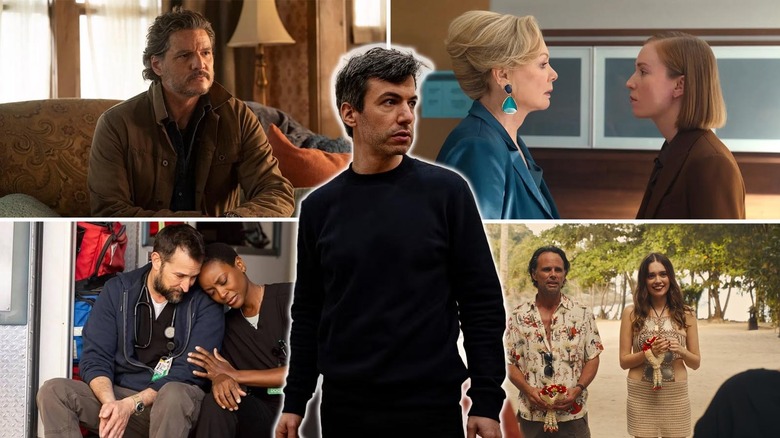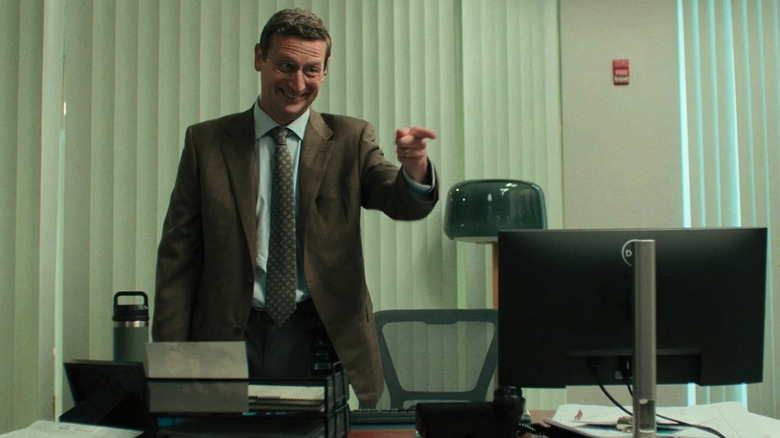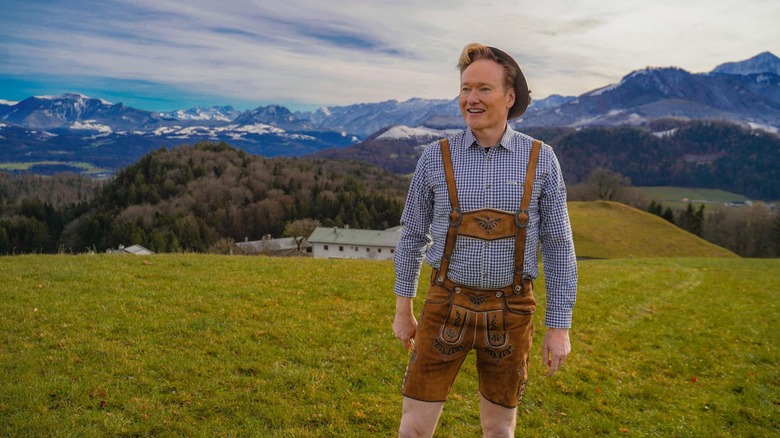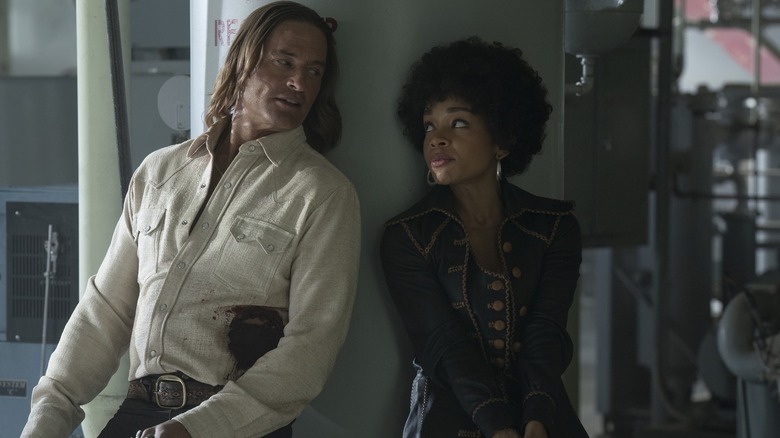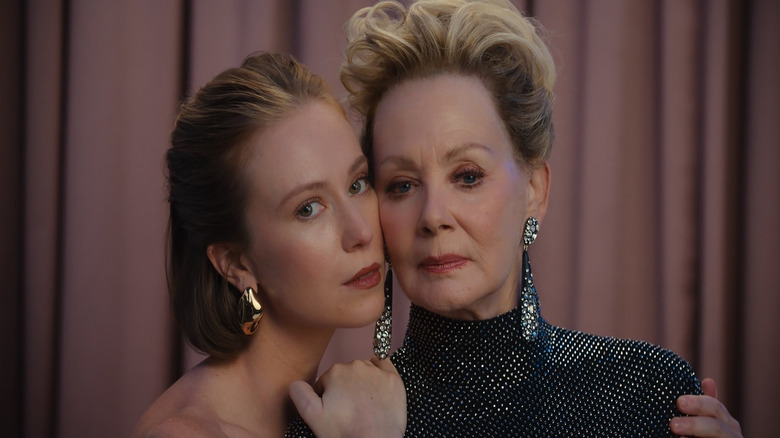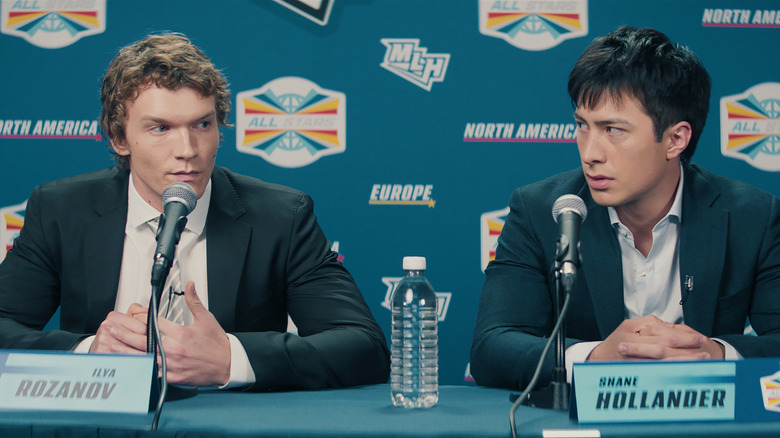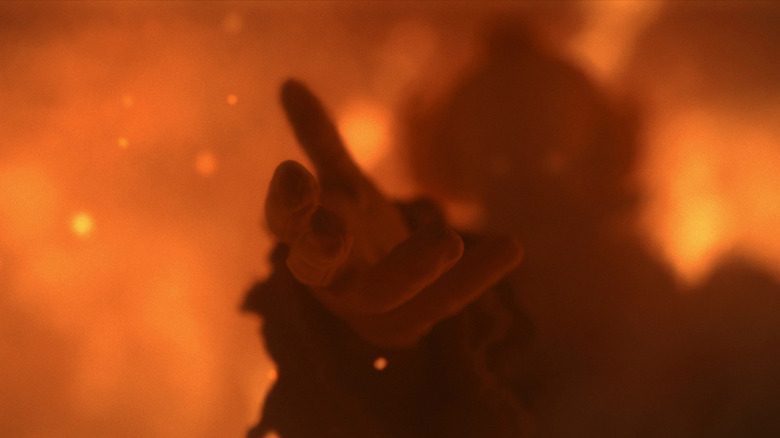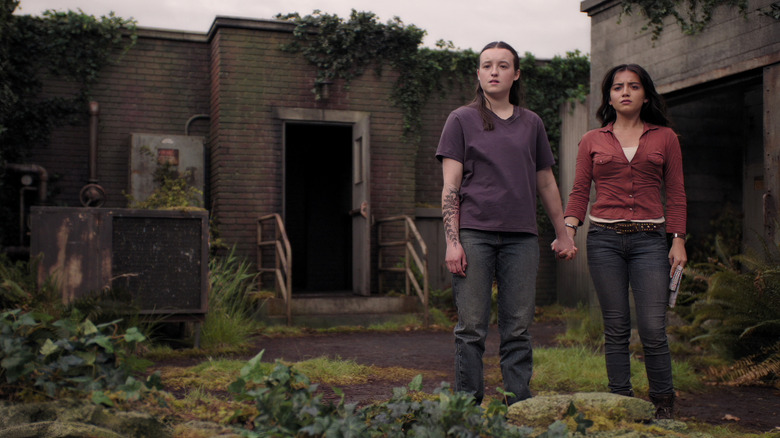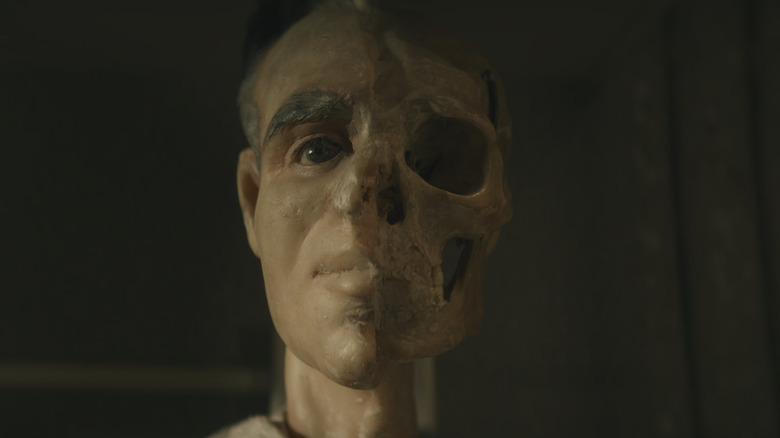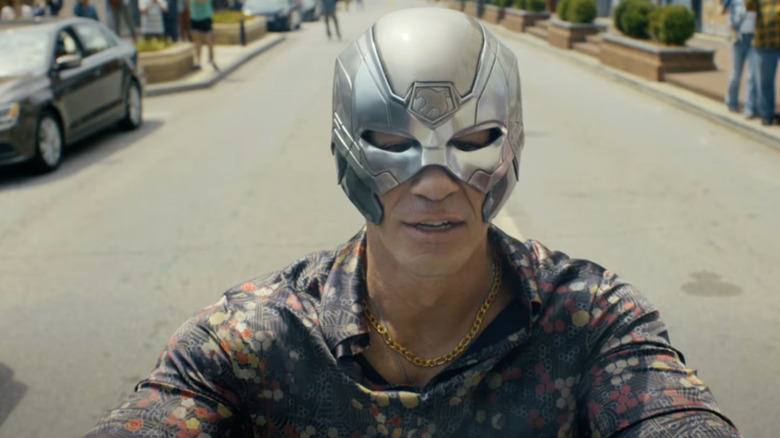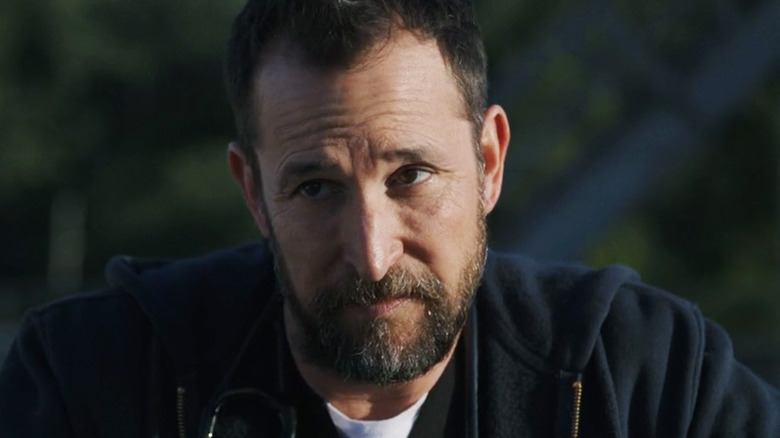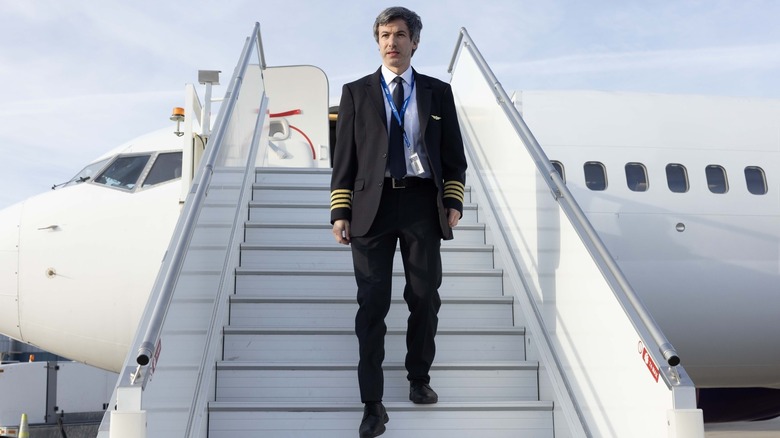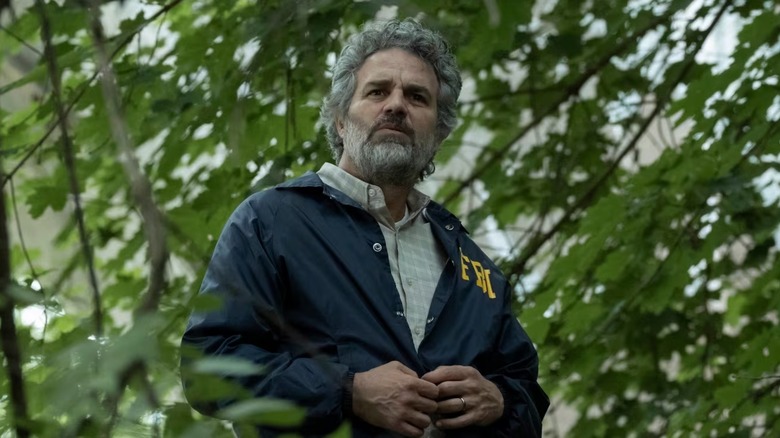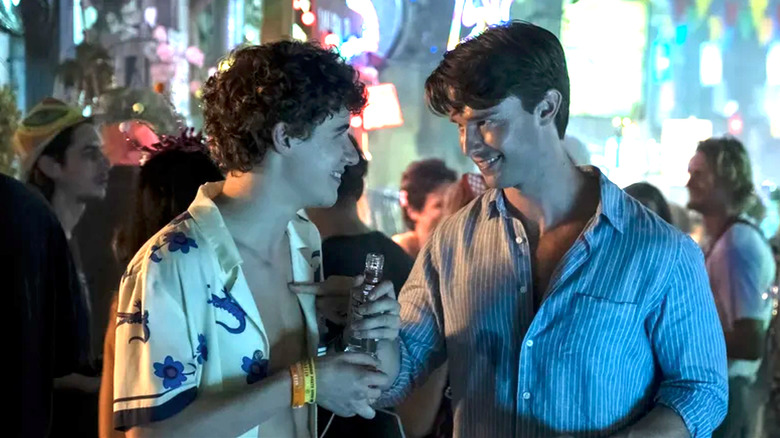13 Best HBO Max Shows Of 2025
The world just keeps getting stranger, but fortunately, we have plenty of distractions or models on how to deal with it all, thanks to television. And if we look toward the empire of HBO, there's an abundance of stories of resilience, shared humanity, and a willingness to laugh through the bedlam. Whether it's the catharsis of watching the wealthy elite destroy themselves with their own bad decisions or the competent optimism of frontline workers trying to save lives, this year's storytelling reflected a world in flux — and offered meaningful ways to navigate it.
Despite continued industry shakeups in the wake of the COVID-19 pandemic and 2023's labor disputes, the artistry is still here with a vengeance. When looking at some of the best HBO series this year, audiences were given a feast of ambitious visuals, unforgettable performances, razor-sharp writing, and bold creative swings that prove prestige TV is alive and well.
Yes, there's still too much to watch — and yes, finding the gems takes time. But that's where we come in. /Film has watched it all, argued it out, and pulled together a list of the best HBO and HBO Max shows of the year. Consider it your guide to what's worth your time — and what might just help you face whatever's next.
The Chair Company
Tim Robinson is known for his ridiculous, off-kilter sketch comedy in the Netflix series "I Think You Should Leave." The former "Saturday Night Live" cast member and writer brings those same comedic sensibilities to HBO in the form of "The Chair Company," a show delivering a mysterious thriller vibe that somehow manages to mesh seamlessly with his trademark absurdity.
In the series, an embarrassing fall during a big presentation at work leads Ron Trosper (Robinson) to dig into the manufacturing of a certain faulty office chair, which leads him down an ominous and perplexing path to a far-reaching conspiracy (maybe). Impressively, Robinson's off the wall laughs don't undercut the suspense of the series, creating a masterful balance of two tones that don't seem like easy bedfellows on the surface. But the result is something that is not only hilarious but endlessly intriguing. There's even an authentic emotional core between Trosper and his family (played by Lake Bell, Sophia Lillis, and Will Price), which also taps into a dose of silliness that actually enhances some of the heartfelt yet admittedly nonsensical moments.
With a mystery that only sparks more questions by the end of the first season, "The Chair Company" is easily one of the best HBO Max shows out there. (Ethan Anderton)
Conan O'Brien Must Go (Season 2)
Conan O'Brien is a national treasure and a staple of television for over 30 years. After retiring from Late Night TV a few years back, he's found a new calling. No, not the podcast he hosts, but with the travel show "Conan O'Brien Must Go," which takes the best parts of Conan's remote travel segments "Conan Without Borders" over the years and turns it up to 11. In season two, O'Brien delivers just a teeny, tiny bit of actually useful information about the places he visits — Spain, New Zealand, and Austria — choosing instead to focus on creating as many hilariously weird and awkward scenarios as possible. O'Brien delivers the best version of himself, an abnormally tall, fiery red pompadour-wielding bufoon whose self-deprecating wit makes him the bottom of every joke, making for some of the funniest moments of 2025 on TV.
Though Conan's interactions with famous people (Javier Bardem is particularly hilarious in the season premiere), it is his interaction with fans where the show shines the most. Whenever O'Brien visits regular fans in each country he goes to, he displays genuine interest in their lives, as mundane as they are, which comes across as charming and also quite funny, before devolving into absurd — like meeting a man named Conan O'Brien from New Zealand. The show is as absurd as any cartoon, with great cameos and legitimately good travel spots. (Rafael Motamayor)
Duster
Who among us isn't a sucker for a noir-inspired series set in the bustling 1970s, featuring some of the most gorgeous cars of the era, and centered on a career criminal and an FBI agent forced to work together to take down a conspiracy? What "Duster" perhaps lacked in originality, it more than made up for in terms of style and flair. Marking co-creator J.J. Abrams' grand return to television since "Fringe," the HBO Max show reunited him with "Lost" star Josh Holloway for a role that couldn't possibly have been more perfect for the super-suave, rogue-looking leading man. The story follows Holloway's Jim Ellis, an overlooked driver in the employ of the dangerous crime lord Ezra Saxton (a perfectly cast Keith David). When FBI Agent Nina Hayes (Rachel Hilson) sets her sights on taking down Saxton at all costs, she crosses paths with perhaps the only member of his inner circle who could be convinced to flip on him.
A hard-boiled mystery and an adrenaline-pumping thriller wrapped in one, "Duster" took the action from the deserts of the American Southwest to the ominous boardrooms of Nixon-era Washington, D.C., to the paranoid rooms of Howard Hughes himself. You may notice the past-tense verbiage here, sadly, as HBO saw fit to cancel the series due to low ratings. But don't let that dissuade you from jumping in a hotrod-red 1970 Plymouth Duster of your own and hitting the highway to experience this twisty, pulpy, and entertaining journey for yourself. (Jeremy Mathai)
Hacks (Season 4)
"Hacks" is one of those shows where, at the end of each season, you cannot imagine how it could get better. But without fail, it returns with each new season to slap you across the mouth for daring to question its brilliance. The Emmy Award-winning season 4 was firing on all cylinders, with its sharp writing, emotionally resonant storylines, and endlessly watchable characters only getting better with every new episode. With Deborah Vance (Jean Smart) now taking the stage as the first woman to serve as a late-night host, the series about women in comedy takes everything that's worked in the previous three seasons and pushes it further, letting the relationship between Deborah and Ava (Hannah Einbinder) evolve in a deeply satisfying way.
After the jaw-dropping cliffhanger of season 3, season 4 embraces their constant push and pull between ego and vulnerability under the highest stakes possible. It's not just about the laughs (though there are plenty); it's about what it costs to stay relevant, to stay ambitious, to stay connected to yourself as an artist. Jean Smart is, unsurprisingly, magnetic, and Hannah Einbinder brings this grounded intensity that keeps you rooting for Ava even when she's a hot, screaming, branzino-throwing mess. Whether it's career shifts, betrayals, or those uncomfortable truths that come out when two people know each other too well, the show leans in with confidence. It's bold, funny, painful, and somehow still feels joyful. If you've ever loved the show, this season reminds you exactly why. (BJ Colangelo)
Heated Rivalry
Okay, so technically, "Heated Rivalry" — the steamy queer hockey series that's taken the Internet by storm — is a Crave original owing to the fact that it's a Canadian production, but the show gained a ton of traction after it dropped on HBO Max, and a second season is already confirmed. The hit show takes place over multiple years and largely focuses on the forbidden, passionate romance between hockey rivals Ilya Rozanov (Connor Storrie, rocking one of the best fake Russian accents I've ever heard in my life) and his Canadian rival Shane Hollander (Hudson Williams). It also brings other queer stories front and center, like the similarly secretive relationship between Shane's friend and New York player Scott Hunter (François Arnaud) and barista Christopher "Kip" Brady (Robbie G.K.).
Not only do Williams and Storie have crazy chemistry that sells "Heated Rivalry" right from the start, but the show is so much more than "the gay hockey show." Every character feels like a real, lived-in person with wants, needs, and desires that they're unable to freely express, and watching both of the show's central couples navigate difficult but deeply felt love stories is thrilling, genuinely hot, and emotionally resonant. Plus, Rachel Reid's novel series "Game Changer," which serves as the source material, has several other books that center around other romances ... so there's a lot more to come from the "Heated Rivalry" universe going forward. (Nina Starner)
It: Welcome to Derry
"It: Welcome to Derry" isn't just one of HBO Max's best new shows, it's quite possibly the most evil series of 2025 (in a good way). Oppressive in its sense of dread and downright cruel toward its young characters, Andy Muschietti's "It" prequel is akin to a forbidden nightmare we shouldn't be privy to. No one feels safe in "It: Welcome to Derry," as Pennywise the Clown's (Bill Skarsgard) reign of terror sees him kill off young characters at any given moment, including those who give the series its heart.
How often do we get to see horror shows where it feels like children are toast? Not just in danger — genuinely doomed. The "It" movies don't shy away from breaking this taboo, but "Welcome to Derry" ups the body count and then some. Yet, it never feels like mindless shock value or exploitative, because Muschietti and co. have crafted a high-stakes story where every character matters, making their plights pack an emotional punch. It's disturbing to watch.
In lesser hands, "It: Welcome to Derry" could have been an unnecessary cash-in to capitalize on the popularity of Stephen King and Pennywise. But that couldn't be further from what's happening here. This is horror that seeks to drag viewers through the wringer while telling a captivating story about a town drenched in evil — supernatural, human-made, you name it. This show is the real deal. (Kieran Fisher)
The Last Of Us (Season 2)
"The Last of Us" season 1 was just about as close to a perfect video game adaptation as you can get — fiercely loyal to the source material, perfectly cast, gorgeously produced, and successful in its own right. That tough act to follow, and the inherently divisive nature of the second game in the series, basically made it inevitable that season 2 would be less universally beloved. But while some decried it as a step backward, others celebrated its greater ambition and decisive changes from the game.
I am one such person.
As Joel (Pedro Pascal) and Ellie (Bella Ramsey) carried the heart of the show in season 1, Ellie and Dina (Isabela Merced) become the emotional core in season 2. Their relationship, frequently sweet and funny, acts as a torch through the season's story of grief, trauma, and vengeance, with both stars turning in career-highlight performances.
The action is more bombastic, evoking the more climactic moments of the "Walking Dead" shows, and the themes are less easily put to rest. While your mileage on some of the changes and tone shifts may vary, it's impossible to argue with the scale and aesthetic created across season 2. The main thing holding it back is the curious way in which it divides the story, leading into the in-development season 3, but we may all look more favorably on those decisions when that next installment finally arrives. (Rick Stevenson)
The Mortician
What happens to us when we die? It's an age-old question, and HBO Max's "The Mortician" offers a particularly disturbing answer — at least, when it comes to the ultimate fate of the physical remains of the poor deceased who were left in the care of Lamb Funeral Home. The focal point of Joshua Rofé's three-part documentary is David Sconce, the funeral director of the aforementioned facility. Showing open disregard for the deceased, he indulged in misdeeds such as cremating multiple people at once and threatening — and even arranging assaults on — multiple competitors.
The documentary chronicles years of strange practices that hid behind Lamb Funeral Home's trustworthy facade, creating a story that's sensational, chilling, and uncomfortably easy to believe. After all, why would the funeral industry be any different from others when it comes to certain individuals attempting to drive a profit at the cost of ethical practices?
What makes Rofé's documentary series so remarkable is that it goes far deeper than the surface. Apart from the case description and the competitor and customer interviews that you might expect from a documentary like this, "The Mortician" heavily features Sconce himself, fresh off a prison sentence and utterly unrepentant. Combined with an in-depth look into the inner workings of the industry most of us hope to avoid as long as possible, the documentary makes for a thrilling, sobering watch. It's easy to see how "The Mortician" quickly became HBO Max's most-viewed documentary series in five years. (Pauli Poisuo)
Peacemaker (Season 2)
Ever since the dawn of the Marvel Cinematic Universe, comic book superhero fans have waited with bated breath to see what the long-standing partnership between DC Comics and Warner Bros. would bring. Sadly, the venture known as the DC Extended Universe was a muddled bust. Part of the goal of co-CEOs James Gunn and Peter Safran in establishing the DC Studios' new DC Universe was to streamline these issues of continuity, canon, and so on. Most filmmakers would've done this with a clean reboot, but Gunn had another, far more crafty trick up his sleeve: he approached the opportunity like comic books, presenting "Superman" and now HBO Max's "Peacemaker" as jumping-on points more than full reboots.
This is especially true of "Peacemaker," which began as part of the DCEU and entered its second season as part of the DCU. Rather than that becoming a disaster, the show flourished, retconning the few things it needed to and barreling ahead with a season-long arc concerning, in cheeky Gunn fashion, a parallel dimension. The big twist surrounding this dimension, along with the way the series has showcased its actors, treated its misfit antihero characters with love, and flaunted its ribald, button-pushing tone, has been truly something to behold. Where "Peacemaker" could've ended up a casualty of a failed cinematic universe, it has turned into a feather in the DCU's cap. It's a shining example of how TV series within a cinematic universe needn't be choked to death by synergy. (Bill Bria)
The Pitt
The best ideas are always the simplest, as evidenced by "The Pitt." With this medical drama, creator R. Scott Gemmill, alongside his fellow collaborators John Wells and Noah Wyle, simply asked, "What if we make an accurate show about doctors?" As it turns out, that's really all you need to make one of the most compelling and consistently riveting shows on TV.
"The Pitt" season 1 was also helped by one of the most surprisingly talented casts of recent years. The show brought together an ensemble of veterans and up-and-comers who delivered such convincing performances as staff members at the fictional Pittsburgh Trauma Medical Center that you immediately started to miss them as soon as the show's 15th and final episode drew to a close (thankfully, "The Pitt" season 2 is coming in January 2026). Noah Wyle, who rightfully won an Emmy for his portrayal of Dr. Michael Robinavitch, took us on a journey through the slow disintegration of an emergency doctor crumbling under the weight of having witnessed non-stop tragedy for years. His final breakdown was one of the most impressively upsetting performances of recent years, let alone 2025, and Wyle deserves every bit of recognition he's getting.
Otherwise, the show was truly remarkable for maintaining the illusion of a functioning emergency room throughout its 15 episodes. Everything from the set (built on a Burbank soundstage) to the medical talk felt real. In that sense, "The Pitt" felt like more than a medical drama. It felt like we were getting a long-overdue insight into the often harrowing experience of working in emergency medicine. While that might not sound like a ton of fun, I defy anyone to watch this show and not immediately want more. (Joe Roberts)
The Rehearsal (Season 2)
The first season of Nathan Fielder's "The Rehearsal" was a total shock for most audiences, expanding the comedian's take on reality TV from his previous series "Nathan For You" into something bolder and much weirder. As Fielder played with the idea of rehearsing important life events and grappled with the ethics of working with child actors, he also helped the show's neurodivergent audience feel deeply seen, with a less typical way of processing the world on display. Season 2 took things to new heights (literally), as Fielder tried to help pilots and co-pilots better communicate using his rehearsal techniques. Of course, things diverge a bit here and there, with an airport-themed reality singing competition as a framing device and a sequence where Fielder portrays Paramount as a totalitarian regime, but eventually Fielder actually learns to fly and becomes a licensed pilot himself.
In the back half of "The Rehearsal" season 2, Fielder learns about how much his show resonated with neurodivergent audiences, and he starts digging into whether or not he might actually be somewhere on the autism spectrum. When he discovers that an autism diagnosis might keep him from ever flying again, he decides not to find out, potentially missing out on a better understanding of himself because of negative biases and misconceptions the world has about those of us who think a little differently. "The Rehearsal" season 2 is absolutely brilliant, and even though I hate flying, I would trust Captain Fielder. (Danielle Ryan)
Task
"Task," as in FBI task force, follows Agent Tom Brandis (Mark Ruffalo), putting together such a team to investigate a series of home invasions (homes used by drug dealers, specifically). Created by Brad Ingelsby, "Task" is a follow-up to his last HBO crime drama miniseries: "Mare of Easttown." It has a similar story: a Pennsylvania police officer working a case while recovering from a family tragedy. The shows share a similar grimness, too.
However, "Mare" was a murder mystery, and so couldn't show the criminal's side of the story without giving its game away. "Task" is more like Michael Mann's "Heat," i.e., going back and forth between the cop and the robber. The man whom Brandis and co. are hunting, Robbie Prendergrast (Tom Pelphrey), is the lead of his own story. Robbie doesn't think of himself as a bad guy; he's stealing from other criminals and trying to help his family. He's faced with a test, though, when a robbery goes sideways and his victim's young son is a witness.
Pelphrey is excellent, but so is Ruffalo. After his recent performance as buffoonish villains in "Poor Things" and "Mickey 17," "Task" reminds you of how well he plays sad men; that's why he worked so well as Bruce Banner, after all. Tom Brandis makes good company for Mare Sheehan as a depressed detective. (Devin Meenan)
The White Lotus (Season 3)
Showrunner Mike White told fans ahead of time that season 3 of this quasi-anthology show would focus on death and spiritualism. He wasn't lying. Even the storylines that aren't explicitly about death — like that infamous brotherly handshake that got the whole internet talking — are still sort of about it. These characters understand they only have one life, and they're struggling to make it mean something. Aren't we all?
White's main skill as a showrunner is knowing how to make his audience uncomfortable. He dives right into thorny topics and refuses to handle them through any kind of voice-of-reason character that might keep the viewer at ease. "The White Lotus" knows it's a show with a predominantly left-leaning audience, but it's never content to preach to the choir; season 3 is constantly shoving viewers out of their comfort zone, forcing us to grapple with characters who don't quite fit into the boxes we'd like to keep them in.
Most uneasy of all is the way season 3 confronts viewers with their own complicity. We want to laugh at these characters for their privilege, for their desires to achieve enlightenment without actually doing or sacrificing anything of note, but the show refuses to let any of them be written off as a joke. Even the worst characters in season 3 are relatable in some way, even if we'd prefer they weren't. "The White Lotus" would be so much easier if it were a straightforward eat-the-rich satire. Instead, it's something far more unsettling, and far more rewarding. (Michael Boyle)
